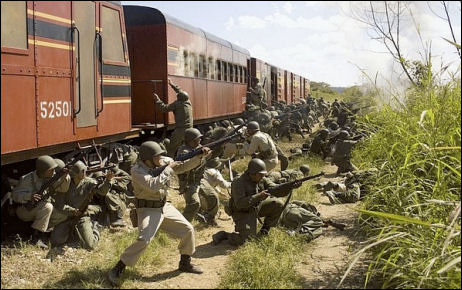The best films about revolutions are those that wind the viewer up to such an extent that by the midpoint he/she wants to join the revolution being depicted. Films, in other words, that literally inject revolutionary serum into the viewer’s veins…the real kind, I mean, and not the bullshit Star Wars kind.
The second best are those that pass along the hard, cold, bitter and dispassionate truth about most revolutions, which is that they’re not all that romantic and are much more complex and complicated and even dispiriting than most of us would like to think.
The very best manage to convey both perspectives.
HE’s list of the finest, tip-top films about the (sometimes disappointing or delusional) drug of revolution are as follows:
1. Steven Soderbergh‘s Che (2008 — both parts)
2. Paul Greengrass‘s Bloody Sunday (’02).
3. Yann Demange‘s ’71.
4. Warren Beatty‘s Reds (’81)
5. Oliver Stone‘s Salvador (’86)
6. Gillo Pontecorvo‘s The Battle of Algiers (’66) and Burn! (’69) — tie.
7. Andrez Wajda‘s Danton (’83).
8. Neil Jordan‘s Michael Collins (’96).
9. Elia Kazan‘s Viva Zapata (’52).
10. Kirk Douglas and Stanley Kubrick‘s Spartacus (’60).
11. Ken Loach‘s The Wind That Shakes The Barley (’06).
12. Raoul Peck‘s Lumumba (’00).
13. Sergei Eisenstein‘s Battleship Potemkin (’25).
Posted on 12.1.08: Che isn’t a pamphlet or a short story or tight three-act “movie” to be savored with a tub of popcorn and a “do it to me” attitude. It’s about luxurious feasting as long as you understand the kind of feast that it is. A big and filling one, certainly, in terms of realism and theme and transportation, but served without conventional “story”, patented emotionalism, movie moments, dessert, coffee, appetizers, waiters, napkins, brandy or any of your standard four-star restaurant perks.
Obviously I’m not mentioning Che‘s subject matter, cinematography, real-life history, performances, etc. I just can’t do it again. Not now anyway. I’ve written about it so many times it’s coming out of my ears.
The people who nip-nip-nipped into this film in Cannes will, I believe, someday eat their words. If, that is, the prevailing opinion trend, which I’m told is starting to move for Che after six months of Cannes after-effect, actually manifests. Among the guilds and the branches, I mean. In which case the nip-nippers will begin to pretend that they liked it all along.
Perhaps there is, in fact, some kind of positive counter-surge brewing among those who are not critics. In the same way that 2001: A Space Odyssey, dumped on by big-city critics when it opened in April 1968, was saved by doobie-tokers. By this I mean people with the apparent capacity to enjoy a film that doesn’t do “drama” and just roll with what it is and what it does.
For me this boils down to the savoring of naturalistic experience, behavior, aroma — a kind of high-end movie versimilitude trip that isn’t trying to arouse and soothe in a campfire-tale sort of way but is strangely immersive all the same.

“Che is a direct challenge to audiences,” declared L.A. Times guy Mark Olsen in a 10.31 article. “Depending on who you ask, Che is either Soderbergh’s greatest masterwork or his grandest folly.”
Che is so fully realized and so completely off on its own humid jungle trail that many don’t get what it’s doing. It is in no way a folly.
